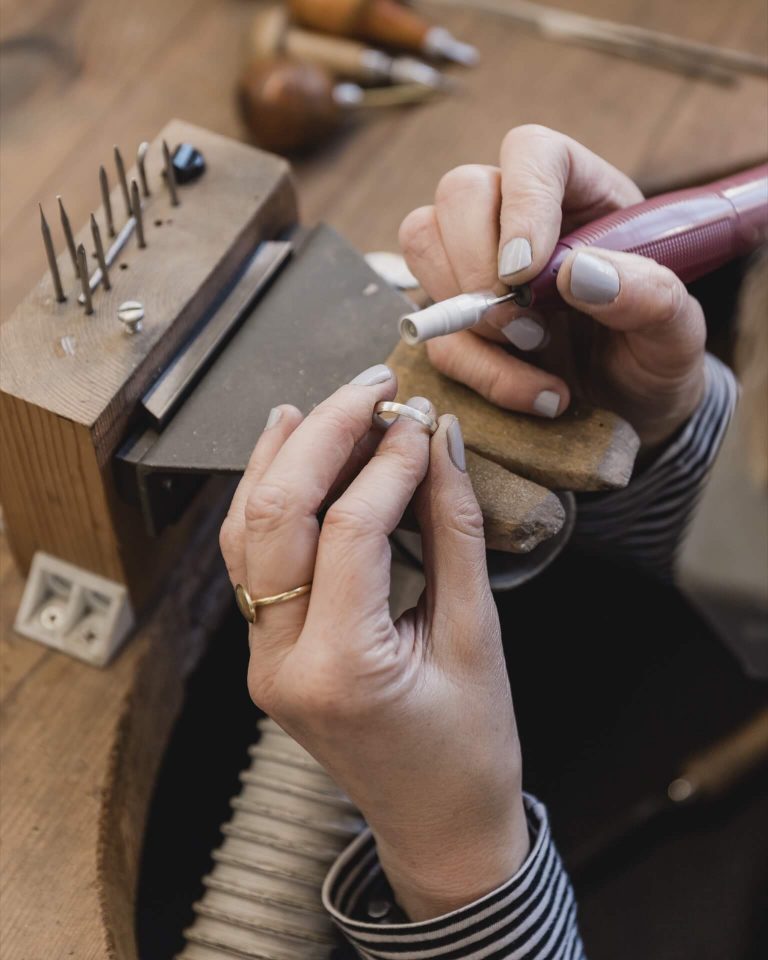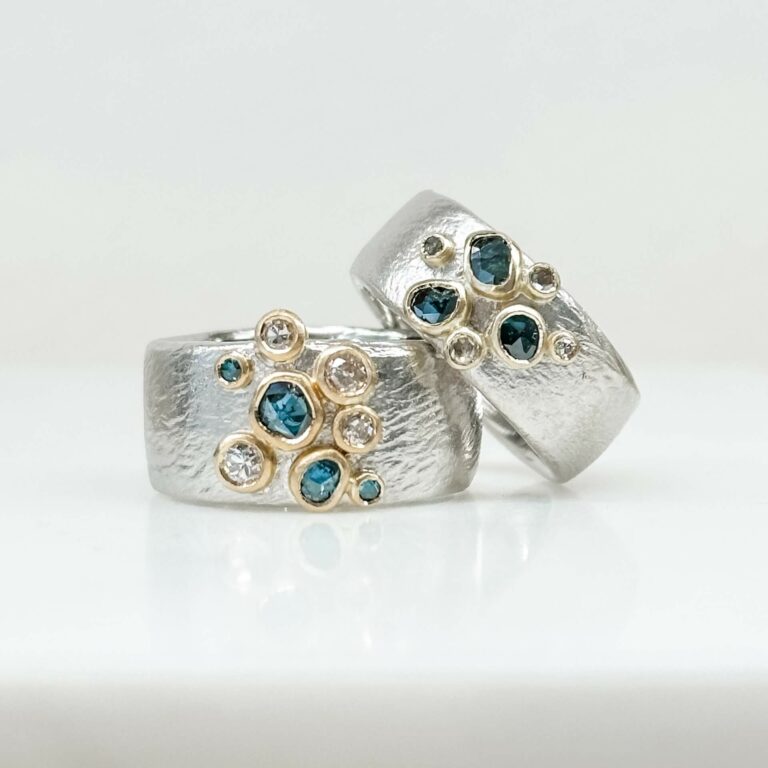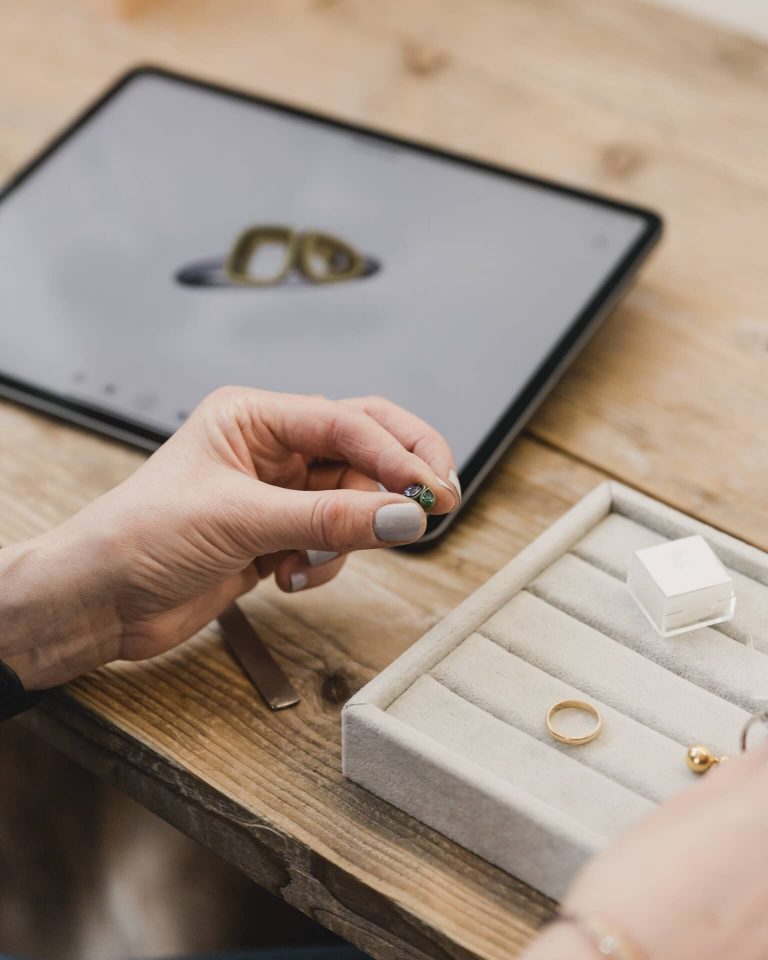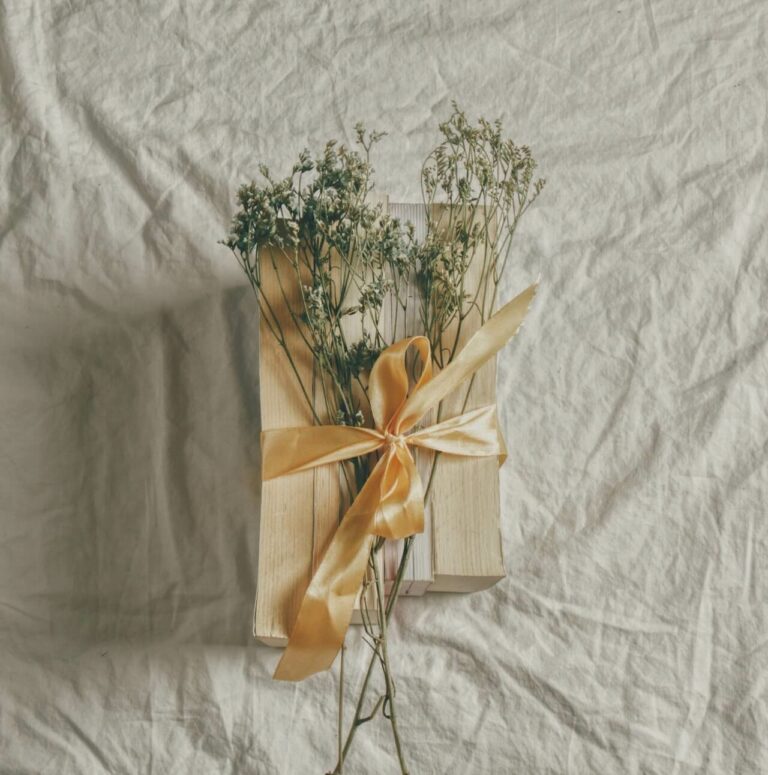Selecting the perfect engagement ring for your partner is a big deal – it truly embodies your love, and there’s no doubt that your partner will get extra fuzzy feelings looking at their engagement ring every day, knowing that it reflects their values and has been sustainably and ethically hand crafted.
Here in the heart of Bristol, Jacks Turner designs beautiful contemporary jewellery with consideration for the planet and people at the heart of her business. Like many other jewellery designers, she is always finding new ways to help the planet or improve her practises.
The jewellery industry is changing for the better, with greater traceability and processes evolving all the time. However, anyone can write “ethical” on their product without backing it up, so if you’re on the hunt for a sustainable engagement ring, there are a few things to look out for.
1. Made of recycled metals
Recycled metals are those that are not newly mined, but come from existing metal that has been processed and refined. The quality is exactly the same as newly mined, but uses less energy than mine extraction and producing new materials.
Precious metals including gold, silver and platinum can be recycled repeatedly without any degradation, so you always get exactly the same purity. They don’t lose any chemical or physical properties during the recycling process, meaning they can be recycled infinitely.
Jacks hand crafts contemporary engagement rings in recycled gold, silver and platinum as standard, sourced from a respectable UK business with traceable supply chains.

2. Ethically sourced gemstones and precious metals
Make sure to look for complete transparency in a jewellery designer’s practises – if they claim to be responsible but don’t share their supply chain, they may not be so eco-friendly and conflict-free.
With Single Mine Origin (SMO) gold, all gold can be traced to a mine accredited with the highest responsibility standards, with a proven social and environmental commitment, and is conflict-free throughout the entire supply chain.
The Kimberley Process (KP) is an international certification scheme that regulates trade in rough diamonds, with a commitment to prevent flow of conflict diamonds with the ultimate aim to completely remove them from the supply chain.
Participants must commit to transparent practices and share critical stats, among other things. So all diamonds and gemstones that are certified KP are guaranteed conflict-free.
A beautiful example of ethical gemstones in an engagement ring, this teal sapphire and diamond trilogy ring is absolutely stunning and, even better, the unique blue-green sapphire is fairtrade, from a traceable mine in Australia.

3. Remodel heirloom jewellery
Perhaps you or your loved one has inherited some sentimental family jewellery which means the world to you but isn’t quite right – it can be reworked into an incredibly special and sustainable engagement ring, perfectly suited to and custom made for your partner.
Whether you’ve inherited a ring, a necklace, or any other piece of jewellery, the gemstones and precious metals can be extracted and given a new life.
Working closely with you to totally transform unused jewels into a contemporary engagement ring that your loved one will wear everyday and truly cherish is a process which Jacks loves. You can read more about her jewellery remodelling process here.

4. Resize a vintage engagement ring
A great way to have a more sustainable engagement ring is by choosing one that already exists, rather than creating a completely new piece of jewellery. Perhaps you or your partner has fallen for a vintage engagement ring which needs to be resized, or the stone replaced with a different coloured or more precious gemstone.
Jacks doesn’t offer this service but many jewellers, specifically those who make jewellery to customers’ exact specifications, will also alter existing engagement rings for you.
5. Keep your jewellery local
This point might seem a little obvious, but if you’re wanting to be really eco-friendly, start looking for an engagement ring locally first. Buying from a local jewellery designer – preferably one who also uses local suppliers wherever possible – will create minimal impact.
There will be fewer emissions needed to obtain the materials and then get your engagement ring to you. If you’re based in the south west of the UK, you can book an appointment to visit Jacks in her Bristol studio.

6. Recycled and recyclable packaging
There’s no excuse for using non-sustainable packaging these days – there are so many options from cardboard boxes, shredded paper packing, recycled paper bags, compostable wrapping… the list is endless.
Plastic is a big problem for the environment, so changing the way businesses approach packaging is really important – plastic costs the Earth, literally.
Recycled and recyclable packaging is widely available, and most jewellery designers will state on their website what kind of packaging they use, as Jacks does in her Ethical & Environmental Statement. If not, a quick enquiry should reveal all.
Respecting the environment and making the most ethical choices really matters. It’s a journey for us all, and no person or brand is perfectly sustainable just yet, but it’s a journey that Jacks is excited to embrace. Whenever there’s an opportunity for her business to improve, she takes it.
“Save the planet” is an overwhelming message, but trying your best to make small changes to reduce the negative impact you have on the environment is important. It’s time to make sustainability the norm, which includes choosing an eco-conscious engagement ring for your loved one.







